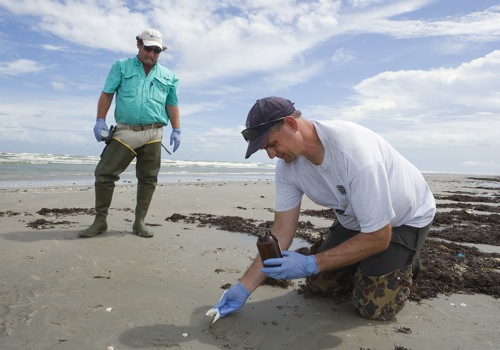TPWD – Biologists Sampling Texas Coast to Prepare for Oil Spill Impacts

TPWD Photograph by Earl Nottingham / TPWD
Teams collect environmental samples at 21 locations in advance of Deepwater Horizon spill impacts
AUSTIN – Texas Parks and Wildlife Department biologists are working their way down the state’s long coast line collecting environmental samples so that a baseline record is available to gauge any impact in Texas from the Deepwater Horizon oil spill. The effort is part of a plan developed by multiple natural resource trustee agencies in coordination with BP.
TPWD is leading specialized five-person teams of scientists who are systematically collecting data at 21 locations up and down the coast. These samples will be used to characterize beach conditions, water chemistry, benthic invertebrates (living creatures in shallow water, mud and sand), and other “indicator” factors.
The department is partnering with the other natural resource trustee agencies for Texas, including Texas General Land Office, Texas Commission on Environmental Quality, U.S. Fish and Wildlife Service, National Park Service and National Oceanic and Atmospheric Administration (NOAA) to complete this effort.
A NOAA contractor is accompanying each team to provide chain of custody quality control and oversee the shipping of samples, which go to contracted out-of-state laboratories for analysis.
Sampling on the upper coast began Monday. As of Thursday, samples had been collected at five locations from the Port Arthur area to West Galveston Island. The process is expected to be complete within two weeks, though higher-than-normal tides, rain and flooding associated with the tropical disturbance in the western Gulf of Mexico may delay operations.
Besides the baseline sampling, TPWD is ready to assist with logistical support for GLO and the Coast Guard in oil spill response and clean-up operations. TPWD support will come in the form of boats, logistics, and trained staff with expertise in dealing with HAZMAT situations. TPWD has already worked with partner agencies to provide information on important or sensitive Texas ecological areas, such as coastal parks and refuges.
TPWD has been monitoring the Deepwater Horizon situation since shortly after it occurred on April 20. Early on, the department began planning for possible contingencies and these plans are now being executed.
For oil observed in Texas waters or shorelines call the Texas General Land Office oil spill reporting line at 800-832-8224.

http://www.youtube.com/user/BPplc?v=b8LX2f-nzTw&feature=pyv&ad=6051159733&kw=